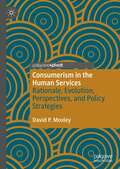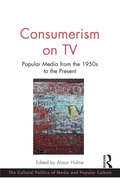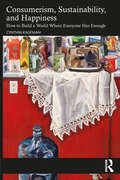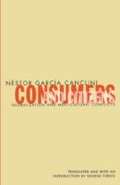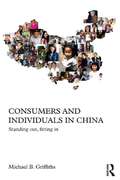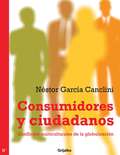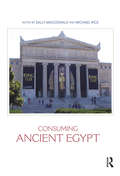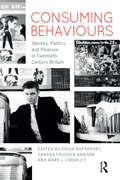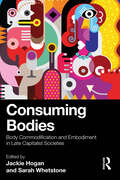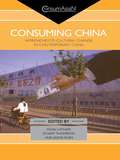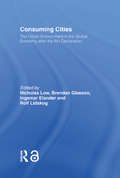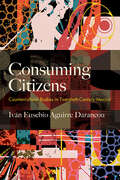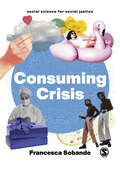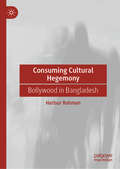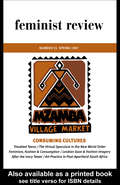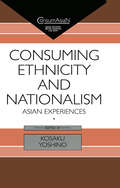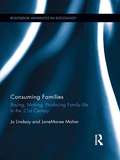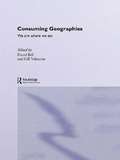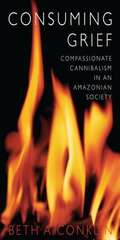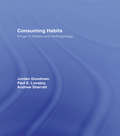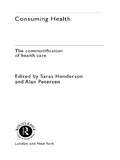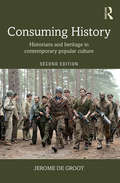- Table View
- List View
Consumerism in the Human Services: Rationale, Evolution, Perspectives, and Policy Strategies
by David P. MoxleyThis book captures the evolution of consumerism in the human services. By addressing the changing roles and contributions of consumers (those working within human service organizations and systems and those working outside of those organizations and systems) the author offers an encompassing framework of consumerism. This framework is multidimensional and incorporates multiple types and forms of consumerism. The author offers a rationale for consumerism in the human services, illustrates its evolution, and considers multiple perspectives and models culminating in policy considerations, including specific strategies. This book will equip consumers, survivors, practitioners, and policy makers with substantive knowledge of how to advance human services through action and innovation.
Consumerism on TV: Popular Media from the 1950s to the Present (The Cultural Politics of Media and Popular Culture)
by Alison HulmePresenting case studies of well-known shows including Will and Grace, Birds of a Feather, Sex and the City and Absolutely Fabulous, as well as 'reality' television, this book examines the transformations that have occurred in consumer society since its appearance and the ways in which these have been constructed and represented in popular media imagery. With analyses of the ways in which consumerism has played out in society, Consumerism on TV highlights specific aspects of the changing nature of consumerism by way of considerations of gender, sexuality and class, as well as less definable changes such as those to do with the celebration of ostentatious greed or the righteousness of the ’ethical’ shopper. With attention to the highly delineated consumer field in which ’shopping’ as an embedded practice of everyday life is caught between escapism and politics, authors explore a variety of themes, such as the extent to which consumerism has become embedded in forging identity, the positing of consumerism as a form of activism, the visibility of the gay male consumer and invisibility of the lesbian consumer, and the (re)stratification of consumer types along class lines. An engaging invitation to consider whether the positioning of consumerism through on-screen depictions is indicative of a new type of non-philosophical politics of 'choice' - a form of marketised, (a)political pragmatism - this book will appeal to scholars and students of sociology and cultural and media studies, with interests in class, consumption and gender.
Consumerism, Sustainability, and Happiness: How to Build a World Where Everyone Has Enough
by Cynthia KaufmanWhat would it take to have a world where everyone had enough? How can we eliminate poverty, leave enough for nonhuman nature, and increase well-being? This book explores ways the reader can live their life, engage with cultural change, and engage with policy making, to build that world. We are presently on a path to environmental destruction, as our societies are driven by forces which leave many people without what they need to meet their basic needs, while also wasting vast resources on an unsatisfying consumer economy. The current system does not lead to a sense of wellbeing, even among those who are relatively materially comfortable. This book focuses on solutions for building a world of enough. It explains how we can reorient our thinking and take the steps necessary to transform our social systems. It looks at ways to reduce the insatiable desire for status and consumption that drive our economies. It focuses on emerging approaches to economics that take well-being as their goal and explores the policies that are crucial for getting there, such as reducing inequality, investing in public goods, and reducing work time. The book arms the reader with a variety of tools for building a world where everyone has enough for a good life.
Consumers And Citizens: Globalization and Multicultural Conflicts (Cultural Studies of the Americas #6)
by Nestor Garcia CancliniIn Consumers and Citizens, Néstor García Canclini, the best-known and most innovative cultural studies scholar in Latin America, maps the critical effects of urban sprawl and global media and commodity markets on citizens-and shows at the same time that the complex results mean not only a shrinkage of certain traditional rights (particularly those of the welfare or client state) but also new openings for expanding citizenship. García Canclini focuses on the diverse ways in which democratic societies recognize markets of citizen opinions, however heterogeneous and dissonant, as in the fashion and entertainment industries. He shows how identity issues, brought to the fore by the aligning of citizenship and consumption, can no longer be understood strictly within the purview of territory or nation. Rather, the postmodern citizen-consumer inhabits a transterritorial and multilingual space, structured more along the lines of markets than states. Defining this space, García Canclini seeks to formulate a participatory and critical approach to consumption in which national culture, far from being extinguished, is reconstituted in transnational, cultural interactions.
Consumers and Citizens: Globalization and Multicultural Conflicts
by Nestor Garcia CancliniIn "Consumers and Citizens, " N(r)stor Garc a Canclini, the best-known and most innovative cultural studies scholar in Latin America, maps the critical effects of urban sprawl and global media and commodity markets on citizens-and shows at the same time that the complex results mean not only a shrinkage of certain traditional rights (particularly those of the welfare or client state) but also new openings for expanding citizenship. Garc a Canclini focuses on the diverse ways in which democratic societies recognize markets of citizen opinions, however heterogeneous and dissonant, as in the fashion and entertainment industries. He shows how identity issues, brought to the fore by the aligning of citizenship and consumption, can no longer be understood strictly within the purview of territory or nation. Rather, the postmodern citizen-consumer inhabits a transterritorial and multilingual space, structured more along the lines of markets than states. Defining this space, Garc a Canclini seeks to formulate a participatory and critical approach to consumption in which national culture, far from being extinguished, is reconstituted in transnational, cultural interactions. "
Consumers and Individuals in China: Standing Out, Fitting In (Chinese Worlds)
by Michael B. GriffithsBreaking new ground in the study of Chinese urban society, this book applies critical discourse analysis to ethnographic data gathered in Anshan, a third-tier city and market in northeast China. The book confronts the – still widespread – notion that Chinese consumers are not "real" individuals, and in doing so represents an ambitious attempt to give a new twist to the structure versus agency debates in social theory. To this end, Michael B. Griffiths shows how claims to virtues such as authenticity, knowledge, civility, sociable character, moral proprietary and self-cultivation emerge from and give shape to social interaction. Data material for this path-breaking analysis is drawn from informants as diverse as consumerist youths, dissident intellectuals, enterprising farmers, retired Party cadres, the rural migrant staff of an inner-city restaurant, the urban families dependent on a machine-repair workshop, and a range of white-collar professionals. Consumers and Individuals in China: Standing out, fitting in, will appeal to sociologists, anthropologists, and cultural studies scholars, China Studies generalists, and professionals working at the intersection of culture and business in China. The vivid descriptions of living and doing fieldwork in China also mean that those travelling there will find the book stimulating and useful
Consumidores y ciudadanos
by Nestor García CancliniConsumidores y ciudadanos es un parteaguas en los estudios sobreciudadanía y cultura. Alejándose tanto de la descalificación delconsumo por su acomodación al mercado como de la celebración delreceptor activo que interpreta los mensajes según sus exigencias, GarcíaCanclini desarrolla una metodología interdisciplinaria que tiene encuenta múltiples agendas. Además, hace propuestas de políticas públicaspara lograr mayor espacio ciudadano, no sólo en los medios sino en todolo que incide material y simbólicamente en la vida cultural, desde laexpansión urbana a los flujos transnacionales y multilingües de bienes yservicios. Por eso, este libro se ha convertido en los últimos años enreferencia para comprender la imbricación de cultura, consumo yparticipación social.»GEORGE YÚDICE«La fortaleza de la escritura ensayística de Néstor García Canclini esla provocación. Su obra puede ser encuadrada disciplinariamenteen el campo de la antropología, de la sociología o de la historia, perosu jugo tiene raíces literarias. El uso de datos estadísticos, cuandoson puestos a bailar, son como personajes en una novela; no quierenconvencer a nadie de algo, sino servir para inocular en la sangre dellector el interés y el placer por el objeto de estudio.»SILVANO SANTIAGO
Consumidores y ciudadanos
by Néstor García CancliniEnsayo de duivulgación científica que explora la relación entre las nuevas maneras de consumo de la actualidad con la responsabilidad ciudadana. "Consumidores y ciudadanos es un parteaguas en los estudios sobre ciudadanía y cultura. Alejándose tanto de la descalificación del consumo por su acomodación al mercado como de la celebración del receptor activo que interpreta los mensajes según sus exigencias, García Canclini desarrolla una metodología interdisciplinaria que tiene en cuenta múltiples agendas. Además, hace propuestas de políticas públicas para lograr mayor espacio ciudadano, no sólo en los medios sino en todo lo que incide material y simbólicamente en la vida cultural, desde la expansión urbana a los flujos transnacionales y multilingües de bienes y servicios. Por eso, este libro se ha convertido en los últimos años en referencia para comprender la imbricación de cultura, consumo y participación social." George Yúdice "La fortaleza de la escritura ensayística de Néstor García Canclini es la provocación. Su obra puede ser encuadrada disciplinariamente en el campo de la antropología, de la sociología o de la historia, pero su jugo tiene raíces literarias. El uso de datos estadísticos, cuando son puestos a bailar, son como personajes en una novela; no quieren convencer a nadie de algo, sino servir para inocular en la sangre del lector el interés y el placer por el objeto de estudio." Silvano Santiago
Consuming Ancient Egypt (Encounters with Ancient Egypt)
by Michael Rice Sally MacDonaldConsuming Ancient Egypt examines the influence of Ancient Egypt on the everyday lives of contemporary people, of all ages, throughout the world. It looks at the Egypt tourist sees, Egypt in film and Egypt as the inspiration for opera. It asks why so many books are published each year on Egyptological subjects at all levels, from the austerely academic to the riotous celebrations of Egypt as a land of mystery, enchantment and fantasy. It then considers the ways in which Ancient Egypt interacts with the living world, in architecture, museum going, the acquisition of souvenirs and reproductions, design, and the perpetual appeal of the mummy. The significance of Egypt as an adjunct to (and frequently the subject of) marketing in the consumer society is examined. It reveals much about Egypt's immemorial appeal and the psychology of those who succumb to its magic.
Consuming Behaviours: Identity, Politics and Pleasure in Twentieth-Century Britain (Criminal Practice Ser.)
by Erika Rappaport Sandra Trudgen Dawson Mark J. CrowleyIn twentieth-century Britain, consumerism increasingly defined and redefined individual and social identities. New types of consumers emerged: the idealized working-class consumer, the African consumer and the teenager challenged the prominent position of the middle and upper-class female shopper. Linking politics and pleasure, Consuming Behaviours explores how individual consumers and groups reacted to changes in marketing, government control, popular leisure and the availability of consumer goods.From football to male fashion, tea to savings banks, leading scholars consider a wide range of products, ideas and services and how these were marketed to the British public through periods of imperial decline, economic instability, war, austerity and prosperity. The development of mass consumer society in Britain is examined in relation to the growing cultural hegemony and economic power of the United States, offering comparisons between British consumption patterns and those of other nations.Bridging the divide between historical and cultural studies approaches, Consuming Behaviours discusses what makes British consumer culture distinctive, while acknowledging how these consumer identities are inextricably a product of both Britain’s domestic history and its relationship with its Empire, with Europe and with the United States.
Consuming Bodies: Body Commodification and Embodiment in Late Capitalist Societies
by Jackie Hogan Sarah WhetstoneOur bodies reveal the values, priorities, anxieties, and material realities of the society in which we are situated, and in contemporary consumer societies, human bodies both reflect the defining characteristics of our time and carry the markers of social hierarchies based on categories such as gender, race, and class.Consuming Bodies: Body Commodification and Embodiment in Late Capitalist Societies explores the ways our bodies are increasingly commodified, from before birth to after death, through both long-standing forms of commodification (captive labor, sex work, and spectator sports) and newer forms (commercial surrogacy, the thriving trade in human biomaterials, female genital “rejuvenation” surgery, global romance tourism, and green burial practices, among others). As this diverse range of topics demonstrates, body commodification reaches increasingly into every realm of our lives, from our most intimate experiences to encounters with pop culture, the “beauty” industries, the medical-industrial complex, and the state.This volume takes a critical perspective on body commodification and embodiment both in the US and across the globe, making an important contribution to social scientific understandings of the body, both by going beyond the Eurocentric approach that typifies much of the extant scholarly literature, and by addressing newly emerging practices that are growing out of techno-scientific and social changes.
Consuming China: Approaches to Cultural Change in Contemporary China (ConsumAsian Series #No. 17)
by Kevin Latham Stuart Thompson Jakob KleinPost-Mao China has been characterized in literature and the media as a burgeoning consumer society. Consuming China investigates this characterization by examining the cultural significance of consumption and consumerism in the People’s Republic of China today. In questioning the notion of consumption, this impressive work suggests that it is not simply a symptom of economic reform within China neither a product of the emergence and transformation of contemporary Chinese capitalism. Rather, the essays offer a new perspective on Chinese consumption by focusing on more than just consumerism, looking at the practices of consumption in relation to different manifestations of social and cultural change. Drawing on case studies from Taiwan, Hong Kong and the People’s Republic of China, Consuming China affords a greater understanding of the practice of Chinese consumption and will appeal to China scholars and anthropologists, and to those with an interest in cultural and gender studies.
Consuming Cities: The Urban Environment in the Global Economy after Rio
by Rolf Lidskog Nicholas Low Brendan Gleeson Ingemar ElanderThis book is about cities as engines of consumption of the world's environment, and the spread of policies to reduce their impact. It looks at these issues by examining the impact of the Rio Declaration and assesses the extent to which it has made a difference. Consuming Cities examines this impact using case studies from around the world including: the USA, Japan, Germany, the UK, China, India, Sweden, Poland, Australia and Indonesia The contributors all have direct experience of the urban environment and urban policies in the countries on which they write and offer an authoritative commentary which brings the urban 'consumption' dimension of sustainable development into focus.
Consuming Citizens: Countercultural Bodies in Twentieth-Century Mexico (SUNY series, Genders in the Global South)
by Iván Eusebio Aguirre DarancouExplores twentieth-century Mexican counterculture through the lens of pleasure, body autonomy, and music and film undergrounds.Consuming Citizens offers a fresh conception of twentieth-century Mexican cultural production by critically tracing the underside of mestizo modernity. Examining a diverse corpus that includes poetry, song, avant-garde film, and more from the 1920s to '80s, the volume uses queer, feminist, and psychedelic theories to understand counterculture-and especially different acts of consumption-as a way of creating culture and alternative social structures. Practices of consuming media, sex, and drugs become means of generating community among subjects who have been marginalized by the nominally inclusive mestizo nation. Consuming Citizens thus rethinks nationalism, citizenship, and society in relation to, and as creations of, countercultural bodies.
Consuming Crisis: Commodifying Care and COVID-19 (Social Science for Social Justice)
by Francesca SobandeConsuming Crisis is a crucial account of how consumer culture capitalized on Coronavirus (COVID-19). Sobande explores how brands claim to care while they encourage people to ‘keep calm and consume’. This critical analysis of the power and politics of marketing examines an eclectic mix of campaigns, content, and experiences. Such work outlines the societal significance of fast-fashion adverts, banana bread’s pandemic ‘moment’, university social media strategies, and how digital technology mediates memories and work. Based on the belief that brands cannot be activists, Sobande creatively considers how brands construct care, camaraderie, culture, and so-called ‘normal’ life during times of crisis. Francesca Sobande is a Senior Lecturer in Digital Media Studies at Cardiff University
Consuming Crisis: Commodifying Care and COVID-19 (Social Science for Social Justice)
by Francesca SobandeConsuming Crisis is a crucial account of how consumer culture capitalized on Coronavirus (COVID-19). Sobande explores how brands claim to care while they encourage people to ‘keep calm and consume’. This critical analysis of the power and politics of marketing examines an eclectic mix of campaigns, content, and experiences. Such work outlines the societal significance of fast-fashion adverts, banana bread’s pandemic ‘moment’, university social media strategies, and how digital technology mediates memories and work. Based on the belief that brands cannot be activists, Sobande creatively considers how brands construct care, camaraderie, culture, and so-called ‘normal’ life during times of crisis. Francesca Sobande is a Senior Lecturer in Digital Media Studies at Cardiff University
Consuming Cultural Hegemony: Bollywood in Bangladesh
by Harisur RahmanThis book examines the circulation and viewership of Bollywood films and filmi modernity in Bangladesh. The writer poses a number of fundamental questions: what it means to be a Bangladeshi in South Asia, what it means to be a Bangladeshi fan of Hindi film, and how popular film reflects power relations in South Asia. The writer argues that partition has resulted in India holding hegemonic power over all of South Asia’s nation-states at the political, economic, and military levels–a situation that has made possible its cultural hegemony. The book draws on relevant literature from anthropology, sociology, film, media, communication, and cultural studies to explore the concepts of hegemony, circulation, viewership, cultural taste, and South Asian cultural history and politics.
Consuming Cultures: Feminist Review Issue 55
by The Feminist Review CollectiveConsuming Cultures is concerned with the interrelationship of gender and the circuits of consumption, distribution, production and reproduction. The book looks at the ways in which gender intervenes in all parts of the circuit or the linkages between different elements.
Consuming Ethnicity and Nationalism: Asian Experiences (ConsumAsian Series)
by Kosaku YoshinoThis book is unique in applying a consumption approach to the study of ethnicity and nationalism, thereby challenging the usual 'top down' approach to nation-formation. Contributors from a variety of disciplines examine the on-going consumption of minority and national cultures by looking at different forms of consumption, including a national lottery, theme parks, museums, cross-cultural handbooks, popular song and audio-visual media. Chapters span diverse parts of Asia '- from Korea, Japan and China to Malaysia and Sri Lanka '- imparting to the volume a rare comparative quality. It should appeal to anyone interested in Asian Studies, as well as in the sociology and anthropology of culture, nationalism and globalisation.
Consuming Families: Buying, Making, Producing Family Life in the 21st Century (Routledge Advances in Sociology #97)
by JaneMaree Maher Jo LindsayThis book explores contemporary families as sites of consumption, examining the changing contexts of family life, where new forms of family are altering how family life is practised and produced, and addressing key social issues – childhood obesity, alchohol and drug addiction, social networking, viral marketing – that put pressure on families as the social, economic and regulatory environments of consumption change.
Consuming Geographies: We Are Where We Eat
by Gill Valentine David BellFood occupies a seemingly mundane position in all our lives, yet the ways we think about shopping, cooking and eating are actually intensely reflexive. The daily pick and mix of our eating habits is one way we experience spatial scale. From the relationship of our food intake to our body-shape, to the impact of our tastes upon global food-production regimes, we all read food consumption as a practice which impacts on our sense of place.Drawing on anthropological, sociological and cultural readings of food consumption, as well as empirical material on shopping, cooking, food technology and the food media, this book demonstrates the importance of space and place in identity formation. We all think place (and) identity through food - we are where we eat!
Consuming Grief
by Beth A. ConklinMourning the death of loved ones and recovering from their loss are universal human experiences, yet the grieving process is as different between cultures as it is among individuals. As late as the 1960s, the Wari' Indians of the western Amazonian rainforest ate the roasted flesh of their dead as an expression of compassion for the deceased and for his or her close relatives. By removing and transforming the corpse, which embodied ties between the living and the dead and was a focus of grief for the family of the deceased, Wari' death rites helped the bereaved kin accept their loss and go on with their lives. Drawing on the recollections of Wari' elders who participated in consuming the dead, this book presents one of the richest, most authoritative ethnographic accounts of funerary cannibalism ever recorded. Beth Conklin explores Wari' conceptions of person, body, and spirit, as well as indigenous understandings of memory and emotion, to explain why the Wari' felt that corpses must be destroyed and why they preferred cannibalism over cremation. Her findings challenge many commonly held beliefs about cannibalism and show why, in Wari' terms, it was considered the most honorable and compassionate way of treating the dead.
Consuming Habits: Drugs in History and Anthropology
by Paul E. Lovejoy Jordan Goodman Andrew SherrattCovering a wide range of substances, including opium, cocaine, coffee, tobacco, kola, and betelnut, from prehistory to the present day, this new edition has been extensively updated, with an updated bibliography and two new chapters on cannabis and khat. Consuming Habits is the perfect companion for all those interested in how different cultures have defined drugs across the ages. Psychoactive substances have been central to the formation of civilizations, the definition of cultural identities, and the growth of the world economy. The labelling of these substances as 'legal' or 'illegal' has diverted attention away from understanding their important cultural and historical role. This collection explores the rich analytical category of psychoactive substances from challenging historical and anthropological perspectives.
Consuming Health: The Commodification of Health Care
by Alan Petersen Saras HendersonIn our post-welfare society, health is increasingly viewed as a commodity and individuals are defined as 'health care consumers'. At the same time, the notion that the state should care for the health of its citizens is being replaced by an expectation that citizens should play a more active role in caring for themselves. These developments are by no means uncontentious. Consuming Health explores the diverse meanings and applications of the term 'consumer' in the field of health care and the implications for policy-making, health care delivery and experiences of health care. Contributors are well-known innovative researchers and lecturers from the Australia, the UK and Canada. Between them they cover a wide range of topics - from the medicalisation of the menopause to the participation of consumer groups in the national policy process - to create an original and thought-provoking text for students and practitioners in the field of health care.
Consuming History: Historians and Heritage in Contemporary Popular Culture
by Jerome de GrootConsuming History examines how history works in contemporary popular culture. Analysing a wide range of cultural entities from computer games to daytime television, it investigates the ways in which society consumes history and how a reading of this consumption can help us understand popular culture and issues of representation. In this second edition, Jerome de Groot probes how museums have responded to the heritage debate and how new technologies from online game-playing to internet genealogy have brought about a shift in access to history, discussing the often conflicted relationship between ‘public’ and academic history and raising important questions about the theory and practice of history as a discipline. Fully revised throughout with up-to-date examples from sources such as Wolf Hall, Game of Thrones and 12 Years a Slave, this edition also includes new sections on the historical novel, gaming, social media and genealogy. It considers new, ground-breaking texts and media such as YouTube in addition to entities and practices, such as re-enactment, that have been underrepresented in historical discussion thus far. Engaging with a broad spectrum of source material and comparing the experiences of the UK, the USA, France and Germany as well as exploring more global trends, Consuming History offers an essential path through the debates for readers interested in history, cultural studies and the media.
